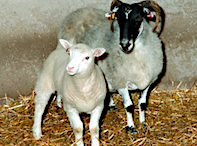UK Business Secretary Greg Clark announced £29 million of funding for the University of Edinburgh’s Roslin Institute — birthplace of Dolly the Sheep, the first mammal to be cloned from an adult cell.
The Roslin investment is part of a £319 million package the UK government has committed for UK bioscience funding over the next five years.
The £29 million for the Roslin Institute will play a vital role in the Biological Sciences Research Council’s mission to further scientific knowledge, particularly around controlling infectious diseases such as bird flu.
Clark said: “Through our modern industrial strategy, we will build on Scotland’s exceptional strengths and use all the tools at our disposal to ensure every part of the country can reach its potential, ensuring that prosperity is spread across the UK.
“Science, research and innovation are at the heart of the industrial strategy which is why we’re providing more than £4.7 billion of additional funding over the next five years, including the £319 million for bioscience research.
“The Roslin Institute is a great example of Scotland’s world class bioscience sector and exactly the sort of project our industrial strategy will support.”
Timothy O’Shea, principal and vice-chancellor of the University of Edinburgh, said: “This investment will help to ensure Roslin’s continuing success over the next five years.
“The institute plays a pivotal role in the university’s mission to tackle the many pressing issues in animal health and welfare, including those which have implications for human health and sustainability of animals in the food chain.”
Professor Melanie Welham, chief executive from Biotechnology and Biological Sciences Research Council said: “Keeping the UK a global hub of vibrant research and innovation requires strategic investment in excellent research.
“I’m delighted that the Secretary of State, Greg Clark, is able to announce this significant investment in bioscience research.
“Alongside other disciplines, bioscience is vital for ensuring UK research and innovation remains competitive, addresses real world challenges and makes a difference to people’s lives.”
